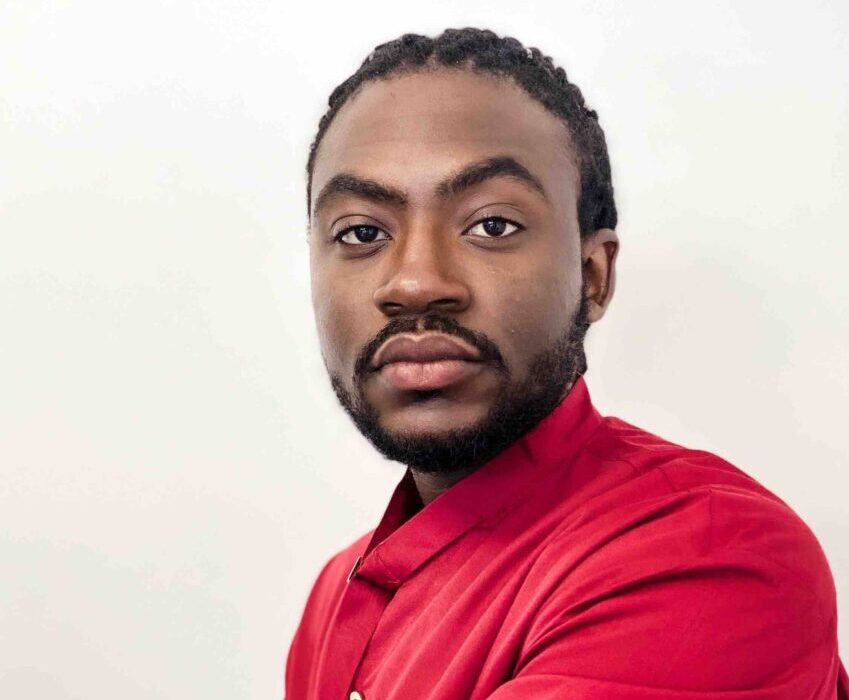ADEBAYO QUADRY-ADEKANBI is a 24-year-old Nigerian born queer man. He lives in Coventry and is studying towards his Sociology PhD at Warwick University.
Faith and Family
I grew up in a Nigerian, heavily Christian household which brings its own difficulties. Right now my family is on a journey. They’re not there yet, but they’re getting there. From my position though, it’s a them problem.
When they’re ready to come to terms with reality, I’ll be here ready and waiting. But they have to go on that journey themselves.
I’ve already been on it. It was painful and long and I’m not willing to relive it, especially when people choose to say hurtful things or be hurtful.
I understand that it’s not because they don’t love me. It’s that their love comes with a condition. That’s not something I’m willing to live up to. My life is for me.
I had to understand that God loves me and adores me regardless of my sexuality. Before this I had been through a lot of hurt and pain in the Christian community.
Conversion therapy was really detrimental to me. Also – Christian friends can encourage the idea that you can be cured, you can be saved or you can just pray about it.
At a time, I saw that as solidarity. But in the long run, I recognised that it wasn’t what I needed.
The idea of a chosen family is very important when it comes to being queer. You can’t always rely on your biological or faith family.
The friends I have around me now, are friends that I know love me regardless.
If as a Christian, you still believe that queer people are wrong, you absolutely need to shut up and keep that to yourself. No one needs to hear that.
You should also go and educate yourself. Organisations like House of Rainbow do this work.
Childhood
The first time sexuality became a really big thing on my radar was when I started school in the UK. People asked if I was gay just because I was effeminate.
I find that the West strongly attaches being effeminate to being gay. That attachment wasn’t necessarily the case in the Nigerian context I grew up in.
I experienced bullying in the UK because of how I was. It was something I really didn’t understand at the time. I wanted some form of acceptance. But I faced a lot of difficulties throughout secondary school.
Dating discussions
I think it’s important that we remember to be an inclusive community.
We are also black, and we are also going on dates. We also want to talk about love. Black gay love exists. Black love exists in many different forms and many different shapes. There should be spaces for that too.
Even simple Clubhouse discussions around who pays first on a date exclude queer people. You’ve automatically excluded us when you ask that question. If you ask whether someone would date a man who doesn’t drive, for example, you have excluded all the people that don’t date men.
Truly safe spaces
There is always an assumed heteronormativity that guides blackness.
Heteronormativity is a worldview that promotes being straight as normal or preferred.
Every time we discuss black issues, queer black people are always placed on the sidelines.
This is problematic because there are queer people who are also black.
So when we’re discussing black liberation – I as a black person, I count too. As a queer black person, I am included in this. There is no black liberation without queer black liberation.
When queer people are trying to affirm our voices and say we deserve space here too, everyone thinks we are dividing the group or losing focus. They need to understand that we should be part of the focus.
Moving forward, the black straight community should honestly think about how they contribute to the struggles that queer people face.
It can be hard for black people to do that. A lot of us do not want to admit that whilst we are oppressed, we can still be an oppressor.
Being marginalised yourself does not stop you from contributing to the marginalisation of other people.
Moving forward
The way we all experience blackness will be different so we have to be inclusive with how we fight for liberation.
The truth is we are not free until we are all free. We have people at the forefront of the black community who are misogynistic or homophobic but we listen to them anyway.
We need a better understanding of blackness. It’s not just about being black American, black British, black African or black Caribbean. It’s also about being black African and queer or black African and trans.
When we can understand how the marginalised can be free, we will be in the best position to understand freedom.
I say that our liberation will come from a 100% queer perspective. It will come from a marginalised, queer perspective. It will come from a queer, feminist perspective.
That is where we can really start to imagine what it means to be free in the world we live in right now.
As told to Shanae Dennis
If you have been affected by the issues raised in this article, you can call Samaritans on 116 123


Comments Form
1 Comment
Great article and interview, thank you for posting this 🙂